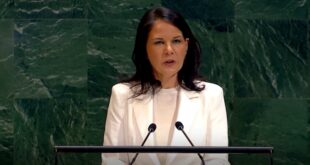The one-day conference on the bloody gridlock in Libya ended with an agreement on a ceasefire, but analysts say a lasting solution to the conflict is still a long way off.
The Libya summit in Berlin concluded on Sunday in Berlin with a “new spirit” to find a lasting solution for peace, German Chancellor Angela Merkel said.
Participants at the conference agreed to uphold a UN arms embargo, which has been in force since 2011, and end military support for the North African country’s two warring factions whose leaders refused to sit together at the talks.
Prime Minister Hayez al-Sarraj, head of the UN-recognised Government of National Accord, and the rebel Field Marshall Khalifa Haftar, leader of the so-called Libyan National Army, were in Berlin but refused to sit together in the same meeting.
“We all agree that we should respect the arms embargo, and that it should be controlled more strongly than it has been in the past,” Merkel said.
She added that the leaders who attended the summit had agreed to continue to hold additional meetings to ensure the process continues so that “the people in Libya get their right to a peaceful life.”
The agreement , signed by 16 states and organizations including the UN, EU, African Union, Germany, France, Italy, UK, Russia and Turkey, is unlikely to have any serious impact on the situation in the country, say analysts.
The issues at stake – power, oil, natural gas, security, control of migration, fighting Muslim extremists – are too complex for a one-day conference to seriously be able to resolve.
The conflict between al-Sarraj and Haftar is over political power in Libya, which has tilted to the side of the latter, with the Tripoli-based UN-recognised government controlling only a small region around the capital while Haftar forces, based in the eastern city of Tobruk, has already established its control over 2/3 of the vast country.
How to bring the two parties together to make peace is difficult as Haftar believes his military victory is only a matter of time.
Moreover, most of the participants at the Berlin conference have their different interests at play in the conflict.
For example, while Italy backs the Tripoli government, the French support the rebel forces. This is because Elf, a French company, is battling Italy’s Eni for a major share of the oil business in Libya.
Russia is backing the rebels through private military contractors while Turkey has sent in troops to defend the Tripoli government. Moscow is desperately seeking a foothold in the Mediterranean while Turkey is also promoting its business and geopolitical interests in the region.
Added to this complexity is the support of UAE and Egypt for the rebels, which is based on an alliance against Islamists of the Muslim Brotherhood who are said to be close to the Tripoli government.
Germany and the EU are principally concerned about getting Libya a stable government to halt irregular migration to Europe.
Reconciling all these interests make quick solution almost illusory, say analysts.
That the conference may not have brought the warring factions together in any significant way was shown by the refusal of the two protagonists to meet face to face at the conference.
Optimists still hope that increased international attention on Libya would bring pressure on all the parties involved to find a solution to the conflict, whose victims include hundreds of thousands of African migrants trapped in the North African country.
Femi Awoniyi
 THE AFRICAN COURIER. Reporting Africa and its Diaspora! The African Courier is an international magazine published in Germany to report on Africa and the Diaspora African experience. The first issue of the bimonthly magazine appeared on the newsstands on 15 February 1998. The African Courier is a communication forum for European-African political, economic and cultural exchanges, and a voice for Africa in Europe.
THE AFRICAN COURIER. Reporting Africa and its Diaspora! The African Courier is an international magazine published in Germany to report on Africa and the Diaspora African experience. The first issue of the bimonthly magazine appeared on the newsstands on 15 February 1998. The African Courier is a communication forum for European-African political, economic and cultural exchanges, and a voice for Africa in Europe.



















